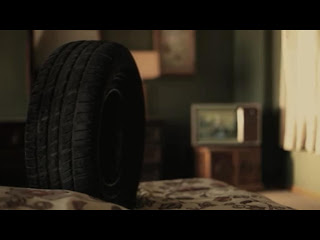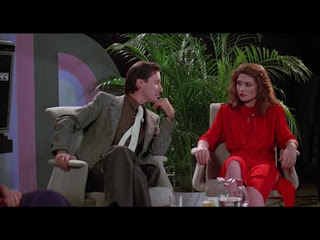Rubber is the tale of Robert. Robert is a tire.
 |
| Robert watching TV |
So...yeah. A sentient rubber tire with psychic murder abilities. That's pretty stupid and extremely ridiculous. Not that I mind a ridiculously stupid movie, but this one is perhaps the most intentionally stupid movies I have ever seen. Just from this synopsis, you might assume that this movie was designed to fall in the so-bad-it's-good category (AKA Lefty Gold), and could be enjoyed with the company of alcohol. In other words, this should be awesome! Be warned, though: somebody is trying to be clever in the midst of all this stupidity.
The writer/director/cinematographer/editor of Rubber is Quentin Dupieux, and from what I have gathered from literally minutes of internet research is that he likes to make Statements with his films. In Rubber, Dupieux appears to be mocking Hollywood's story conventions. To do this, he wrote an astonishingly bad movie premise and found his own unique way to comment on how bad movies are.
 |
| This one, for instance, has a turkey bedroom scene |
Let's go back to the beginning of the film. Officer Chad's speech is not to the viewer at home, but to a group of viewers in the film itself. That's right, this movie is metatheatrical. ***Sigh*** The viewers are all annoying characters, whining about how they are bored or because they are hungry, or because some of them are talking too loud. Luckily for you, the actual viewer, Officer Chad's sidekick murders them when he feeds them poisoned meat.
As for Officer Chad, he is both a character in this movie and an actor who knows that he is playing a character in the movie. Dupieux plays with the notions of reality and fiction, audience and active inclusion for a while, and then the movie ends.
 |
| But not before this stand-off scene. Really. |
From a critical perspective, I have to admit that Dupieux shot a beautiful movie. Wings Hauser turned in a solid performance as the least annoying audience member. And...that's about it. There's not a whole lot to recommend Rubber. I will admit that I was expecting some true B-movie Lefty Gold when I decided to watch this (on the suggestion of my friend Peanut Butta), but that notion was erased by the opening scene. This is a B-movie caught inside a pretentious film about audiences and narrative expectations. Is it clever? Sure, but it would have been far more enjoyable if the characters didn't constantly point out how clever the movie was. What frustrates me most about Rubber is that I was moderately entertained for the first fifteen or twenty minutes; granted, it was entertainment based on me being confused and wondering what the hell was happening, but that's still entertainment. After that point, I found the film alternately dull, stupid, and pretentious. It got a hell of a lot worse for me when Officer Chad broke character and told everyone to go home. Why would he do that? Because he knows this is a shitty movie, and he wants it to be over with as much as you do. That's why he had the audience killed; with no one watching, there is no need to pretend. Unfortunately for everyone, Wings Hauser didn't die by turkey, so the story continues.
Now that I think about it, I wish Wings had died with the rest of the audience and the film ended when Chad wanted it to. That might have been clever (and short) enough to overcome the self-congratulatory nature of this film. Oh, what might have been...! As it stands, though, Rubber pissed me off by managing to not make a fun stupid movie and then kept elbow-nudging me, asking if I "got it" over and over, until it finally ended. This is a "love it" or "hate it" movie, and I sure some people will find the unexpected directorial intent juxtaposed with exploding heads to be mind-blowing. I hope those people are either very young/stupid or drunk, and not just annoying hipsters. Personally, I took Rubber to be a giant middle finger to anyone who decided to take a chance on a stupid movie. Fuck you, too, Rubber.
































